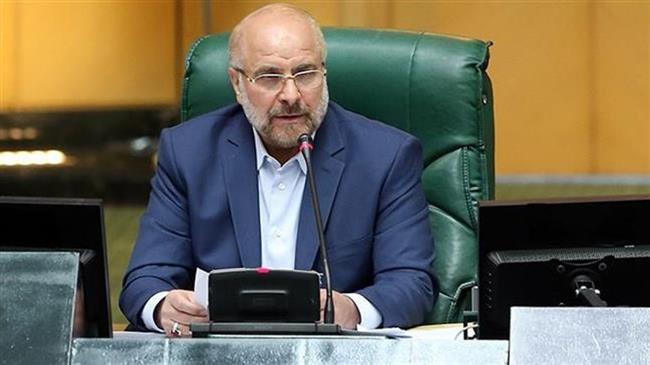Parliament speaker: Assassination of Gen. Soleimani poses threat to intl. peace, security
Iran’s parliament speaker says the assassination of the country’s top anti-terror commander, Lieutenant General Qassem Soleimani, by American forces last January has posed a major threat to international peace and security while jeopardizing regional security as well.
Mohammad-Baqer Qalibaf made the remarks in a letter published on Monday to his counterparts in other countries in addition to heads of international, Islamic and Asian parliamentary unions and Secretary General of the United Nations Antonio Guterres.
Reminding the addressees of the assassination of General Soleimani by a US drone strike outside Baghdad International Airport on January 3, 2020, Qalibaf wrote, “The terrorist act, which contravenes the United Nations Charter... and [other] international conventions, has greatly undermined the efforts launched by the international community to fight terrorism and the rule of law in international relations.”
Qalibaf added that the assassination of Iran’s top general has also “dealt a severe blow to regional security and tranquility in addition to jeopardizing international peace and security.”
Iran’s parliament speaker strongly condemned the US administration, saying the blatant terrorist attack took place while there was no state of war between Tehran and Washington, adding that from the international law perspective, the visit of the senior military official of the Islamic Republic of Iran to Iraq posed no serious or immediate threat to the US government as it was meant to contribute to peace and stability in the region and the fight against terrorism.
The Iranian Parliament “vehemently denounces this act as an example of organized state terrorism, a clear violation of the national sovereignty and independence of Iraq, and a violation of the Islamic Republic of Iran’s sovereignty,” Qalibaf noted.
He concluded that given the role of parliaments and the international community in promotion of global peace and stability and the fight against terrorism, especially state terrorism, Iran expects the addressees to act responsibly and to provide the necessary legal framework to prevent the recurrence of such terrorist catastrophes.
The former commander of the Quds Force of Iran’s Islamic Revolution Guards Corps (IRGC) and his companions, including top Iraqi counter-terrorism official Abu Mahdi al-Muhandis, were assassinated in a US drone strike while General Soleimani was on an official visit to the Iraqi capital.
The strike, which was directly ordered by US President Donald Trump, triggered a strong anti-American backlash across the region, leading to growing calls for the US military to end its presence in the Middle East.
Iran unleashed a barrage of missiles on a US military base in Iraq on January 8 as part of its revenge for the assassination.
US positions in Iraq have since been targeted several times.
Recently, Leader of the Islamic Revolution Ayatollah Seyyed Ali Khamenei said revenge for the Iranian general was certain and would be exacted in due time.
Iran has issued an arrest warrant and asked the international police organization Interpol for help in detaining Trump, who ordered the assassination, and several other US military and political leaders behind the terrorist act.
‘All wars have rules. All of those rules have been broken’ by Israel
VIDEO | Report flags India’s violation of rights of Rohingya detainees
Turkey's foreign minister meets Syria's de facto leader in Damascus
'Next to impossible' to rescue patients from Gaza's Kamal Adwan Hospital: Director
VIDEO | Vietnam current prosperity
Report blames gasoil exports for shortage at Iranian power plants
VIDEO | Hind Rajab Foundation names Israeli war criminals vacationing after Gaza genocide
VIDEO | Australians rally for Gaza ahead of Christmas festivities












 This makes it easy to access the Press TV website
This makes it easy to access the Press TV website